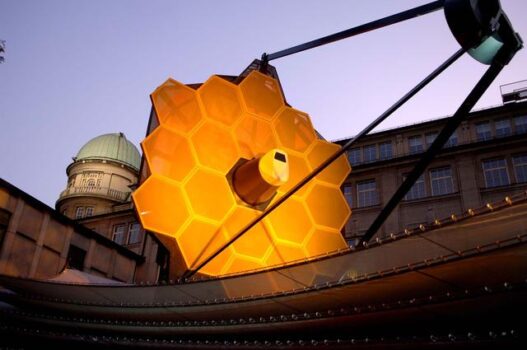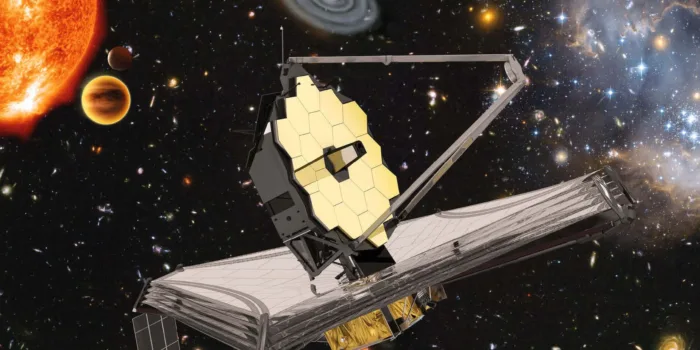The Transformer Telescope, the James Webb Space Telescope, launched successfully on Christmas Day. Moreover, at ER Precision Optics, we like to imagine it now in deep space. It’s glittering in darkness like a diamond-bright miniature star.
When we first mentioned it on our blog, we talked about the amazing technology behind it. In this blog, we bring you its update because it cradles and bristles with so much of the technology we work to manufacture.
Certainly, scientists could not have created this transformer telescope without parts like gimbals, germanium and silica crystals, semi-conductors, and precision optical components. Furthermore, as you probably know, those technologies are our business here in Central Florida.
The James Webb Space Telescope: The Transformer Telescope

2022 Welcomes the Launching of the Webb Transformer Telescope and New Exploration of the Stars: Another “Step for Mankind.”
Usually, our space satellites and space-roving probes have a fairly easy time of life after a harrowing launch. However, the James Webb Space Telescope, affectionately dubbed the Transformer Telescope, has just begun several terrifyingly delicate transformational procedures. Additionally, each procedure is as equally critical to its success as the launch. –And, we might add, equally, nerve-wracking to its engineers, inventors, scientists, and manufacturers.
An Image for the New Year: A Transformer Telescope Building Itself in Space
Yesterday, Dec. 29th, the James Webb Space Telescope or JWST has successfully began a key task vital to its survival. Even as it travels to its destination 1 million miles away, it has gone to work unfurling a gigantic sun shield.
Scientists began sending commands to enact the “unfurling a giant umbrella-like shield. ” Its purpose is to protect the delicate instruments of the telescopic array “from the intense radiation of the sun.”
Consequently, this is why some call it the world’s first transformer telescope. Its sun shield was folded intricately so it would fit into the launching rocket.
So earth-side engineers had to command this strategic unfolding of the sunshade. It was likened to gently opening a giant paper origami sculpture. Its size and shape would be manipulated in moves much more complex than the creation of an origami paper sculpture. That’s why we call it the transformer telescope.
Steps to Sun Safety

The Gold Covered Mirror Assembly Has a Story. Check Our Previous Blog. Space Telescope: Downloaded From NASA. Note the Membrane-like Sails at the Bottom Of Image.
The deployment of the sunshade reminds us also of rigging sails for a sailing ship.
1. First the 10 billion dollar telescope had to extend and lower 2 arms to hold the membranes of the shade. That happened on Tuesday, slowly and sweetly. Engineers called those arms the “utilized Pallet Structures.” See the folded-up sun shield at this convenient online resource.
2. Think of these “arms” like the upright walls of an apartment building. Instead of floors, they support five ultra-thin membranes made of a shiny material called Kapton…”
3. Each membrane must be operated into place with a series of cables and pulleys. Again, this makes us think of the rigging of vast sails on a ship.
4. However, in this case, the “sails” are each the size of a tennis court. That means the operation neatly stacks each one over the telescope itself. It’s a giant, five-layer parasol to protect and cool the delicate infrared instruments of the James Webb Space Telescope.
The Transformer Telescope: Taking the Next Steps

Fantastic View in Space: Moreover, Note the Investigation is in Progress.
We do not wonder why this procedure took several days. Engineers carefully executed each step.
Now, Webb’s engineers have also “released and rolled up the sun-shield covers. Those are the shields that protected the thin layers of Webb’s sun-shield during launch.” “After the team electrically activated release devices to release the covers, they executed commands to roll the covers up into a holding position…” This exposed “Webb’s sun-shield membranes to space for the first time.” It must have been a breathtaking moment for the scientists.
Why the Sunshield is Critical to Success
Why was the telescope transformed in this fashion? “The successful deployment of the sun-shield will keep the temperature of its instruments just above absolute zero…” And we must add, this protective measure will “minimize infrared background “noise” in the form of heat from the sun.”
Then, the telescope will be able to clearly see into galaxies and stars, “far, far away.” In fact, because of the protected infrared technology, the Webb Telescope will give us the clearest pictures and hundreds more stars, further away than mankind has ever previously “seen.”
The Backstory on the Webb Telescope
As we have quoted NASAA previously, “the James Webb Space Telescope is the world’s largest, most powerful, and most complex space science telescope ever built.” Its mission is a challenging one with as many folds and segments as its sun shield.
The Transformer Telescope is a detective investigating the Universe. In the words of NASAA,
- The Webb will “solve mysteries in our solar system…”
- We sent it into space to take a long look beyond distant worlds.
- We want it to investigate the make-up of distant stars.
- It is charged with probing “the mysterious structures and origins of our universe and our place in it.
Proof of Peace and Cooperation

We Have Always Been Curious About About Our Universe. Additionally, Now the Webb Space Telescope is Poised to Investigate Worlds Far Beyond Our Own.
We would be remiss if we did not again mention that this is not just an American adventure. The Webb Space Telescope “is an international program led by NASA with its partners, ESA (European Space Agency) and the Canadian Space Agency.” Would you like to know more about the transformer telescope? Learn more about the Webb at these convenient sources.
- webb.nasa.gov
- nasa.gov/webb
- webbtelescope.org
- stsci.edu/jwst
Soon, the Webb Telescope will open its fabulous mirror and bring us insights into distant worlds. Additionally, it will give insights into the creation of our own galaxy. Don’t worry, ER Precision optics will be sure to bring you updates, as the transformer telescope continues its amazing voyage.
Meanwhile, we continue to celebrate the New Year of 2022 with a new little star, the Webb Telescope. It shines, not only above us but in our abstract “sky” of technological accomplishments for humanity.


